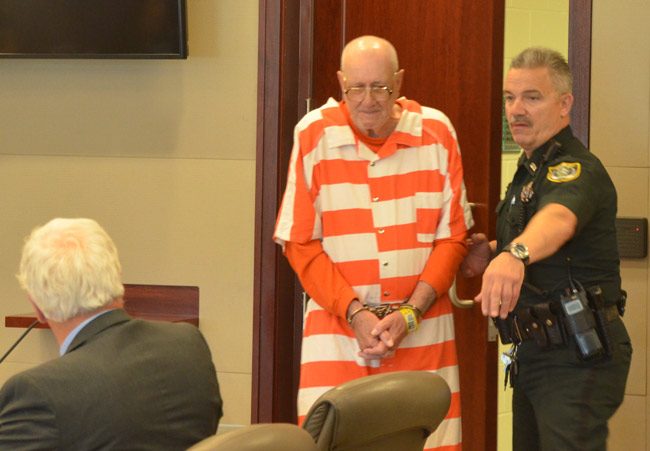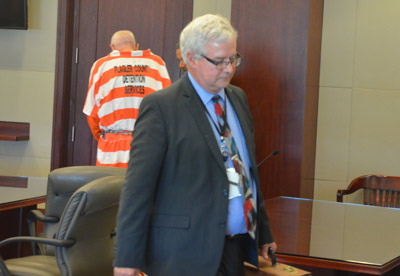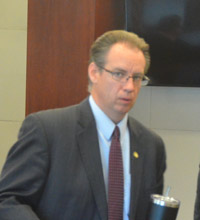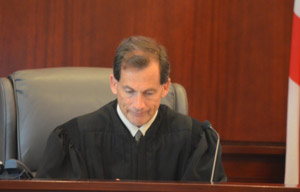
Defendants claim “ineffective counsel” often when they have no spaghetti left to throw at their prison walls. It rarely sticks. To make the claim stick, they have to prove not only that their lawyer did a bad job, but that it was so bad that it breached the profession’s standards.
That’s what Paul Miller is claiming. Miller, now 70, is serving life in prison for the March 12, 2012 murder of Dana Mulhall, his neighbor on South Flagler Avenue. The two had been arguing over Miller’s barking dogs. When Mulhall came up to Miller’s fence and shook it, and after the two exchanged words, Miller shot him with his 9 mm handgun, five times, in five, spaced out shots, two of them in Mulhall’s back, apparently as Mulhall was crawling away. He died on the stoop of his own home. Mulhall was unarmed.
Miller is now arguing through his new defense attorney—public defender Ray Warren—that he’s in prison not because he shot Mulhall, but because Doug Williams, his defense attorney at trial, did not call a self-defense expert to the stand or make a motion for a self-defense, stand-your-ground hearing. If that motion had been granted, presumably with the help of that self-defense expert, the case would not have gone on to trial, and Miller may have been set free.

The jury had a lot of help, all of it from Miller who, in his 911 call immediately after the shooting, said of Mulhall that he’d “shot his fucking ass,” but never once said that Mulhall had threatened him with a gun. Miller had also taken the stand in his own defense, and on the stand turned out to be not a kindly Southern gentleman but an aggressive boor who repeatedly insulted the prosecutor, called her “stupid,” revealed himself to be a sexist and rash.
That was not the plan, Williams told the court today.
Williams was in court again for the second day of Miller’s motion of ineffective counsel. The first was on March 9, when the court heard from the use-of-force expert that Warren—Miller’s attorney—said should have been called at trial.
Trial strategy is a closely guarded secret for attorneys. It can be inferred at trial, but inference is not certainty. Today, Williams revealed his trial strategy in the Miller case, explaining why he had not called the use of force expert, and why it had been a conscious decision: ““I thought he was the best witness. I didn’t want to have the state have two cracks at him,” meaning during a stand your ground hearing and, if that failed, again at trial (though in fact if the stand your ground hearing would have failed, it would have been a clear indication in itself that trial would go no better precisely because Williams was resting his case on Miller’s testimony). He also claimed that a stand-your-ground motion before then-Judge J. David Walsh would have likely failed, because Walsh was not one to grant such motions.
At the time, Williams was assisted in the case by co-counsel Carine Jarosz, and by Melissa Moore-Stens, who has since become a county judge. She had not appeared in court at Miller’s trial with Williams but had helped. Williams today to some extent placed the responsibility of some of the preparatory work in the trial on Jarosz and Moore-Stens. But in the end, as Warren pressed question after question about why Williams never called the use of force expert, Williams held his ground, saying it had been a strategic decision because of his placing “all your eggs in the Paul Miller basket,” as Warren put it.

Put another way, Williams’s remarkable admission on the stand today that he simply and consciously did not not consult with a use of force expert, not even to test the grounds of such an approach, not even to learn what he might not know about a self-defense strategy, hurt him considerably, and was to Miller’s advantage. Warren had been able to narrow down that small victory after a staccato of seemingly innocuous questions he fired at Williams one after the other until he got to the heart of Williams’s strategy–what Warren portrayed as a flawed strategy even before it was enacted.
Warren and Craig got into a bit of a verbal duel as Craig repeatedly questioned what the use-of-force expert could possibly have said that would have made a difference in the trial, given Miller’s own behavior at trial. It went like this:
Craig: “What is it about what the use of force expert is saying that Mr. Williams wouldn’t have been aware of? What if Mr. Williams knew all the information we heard from the use of force expert, and knew all those things when he was sitting down with Mr. Miller to decide whether or not he was going to talk to one?”
Warren: “Then he can make the strategic decision and call it strategic. But you can never call a decision strategic if you don’t even know the option.”
Craig: “I don’t know that he doesn’t know the option. That’s my point. I don’t know that he didn’t known the options. I didn’t hear that today.”
Warren: “He didn’t consult with one. There’s no way he could have known. He said he wasn’t an expert and he testified he wasn’t an expert.”
Craig: “That doesn’t mean that he doesn’t know practically everything that the expert testified to. Just because you don’t qualify as a legal expert doesn’t mean that you don’t have a legal background.”
Warren: “Well, since he indicated that he had never talked to one and had never handled one of these cases before, he’s still back in the same scenario.”
Craig: “I mean, I don’t even know whether Mr. Williams has any training in firearms or things like that or any self-defense training or anything.”
Warren: “Yes.”

Warren: “No, all you know is that he didn’t file the stand your ground motion to have it heard in front of a judge on a lower burden of proof, because he did n ot consult with somebody, because you’re always going to be able to argue that somebody might know something more. That argument is always predicated on somebody else might know something more.”
Craig: “Well, how do I know that if he had talked to an expert that would have made any difference as to whether he’d hire one or not?”
Warren: “You don’t, because he didn’t.”
But between that exchange and the way Warren had won Williams’s admission that he’d never so much as considered consulting a use of force expert, Warren had scored to big victories that no transcript on appeal, should it get that far, could hide. It’s the sort of appeals trial judges hate to lose.
So of all the hearings before the Miller trial, the trial days and the two days of hearings this month, that exchange was the most hope Miller—who sat a few feet to Warren’s right, struggling to hear before he was fitted with a hearing aid—may have had for something going in his favor.
But Assistant State Prosecutor Mark Johnson did his best to make sure the moment did not grow into a more effective argument than it seemed, namely by bringing the issue back to what is known, as plenty is–not what Williams did not do, but what Miller did do at trial. By Williams’s own description of how his preparation of Miller’s testimony had clashed with the way Miller actually testified, it went disastrously bad. “I was taken aback,” Williams said.

But what the March 9 and today’s hearing did was complicate matters for Craig. It would not be as simple as denying a motion of ineffective counsel, as it could have been, ironically, had Miller for this motion had an attorney less sharp and skillful than Warren. Craig said he would take the matter under advisement, meaning that he would rule in coming days. When? There’s no telling: “We’re in the process of changing the entire division around,” he revealed of the goings-on behind the scenes at the courthouse, changes in part triggered by the forced exile of embattled Circuit Judge Scott DuPont, whose significant docket Craig and other judges have had to assume.
“My time is very limited,” he said, hinting that his days on Flagler’s felony bench may be limited as well. But he assured the attorneys that wherever he ends up, “I’ll make the decision on this one regardless.”
If the motion is granted, the Miller case would most likely re-start at zero, on the pre-trial docket, potentially heading either for a new trial or a plea agreement as any new case would.
As for Miller, he was to be sent back to state prison: no sense keeping him at the county jail even if the judge were to rule in his favor, Craig said, since the next step after that would take place months from now. That only added to Miller’s glimmer of hope, and the arresting possibility that his motion, unlike Mulhall, could have life yet.






























Jeb plugarski says
Keep him in there.
Anonymous says
He knowingly and with forethought took a life. He did it while his victim was crawling away from him. He needs to pay the consequences for his murderous conduct and others need to see that such is the case with people who feel entitled to kill others who p*ss them off.
Veteran says
Let the old fart go!
Concerned Citizen says
What he should have received was the death penalty. He cold bloodily killed a man. If we do away with the death penalty then we give people the right to kill with no consequence. How is it punishment to receive a life sentence when you murder someone? Then society has to feed cloth and shelter you until you die.
Anonymous says
No surprise. I have not seen public defenders do much in this 7th judicial district. In fact, all they try to do is encourage a plea—never argue a defense. When it comes to being appointed a public defender one may as well put their head between their legs and kiss their ass good bye. They are about as useless at the state attorney office.
blondee says
@Veteran –and let him move next door to you.
Cindy Welborn says
I’m so mad right now I have no comment.
Geezer says
Paul (the killer) Miller has a lot of time for reflection now, and no doubt
he will continue to shoot as much flak as he can.
I am reminded of chimps throwing poop.
Rick Kang says
Shooting someone in the back while he is on the ground is NOT “Stand your ground”- It is MURDER! Put this JERK on “Change Gang” to earn his keep! Blondee is correct!